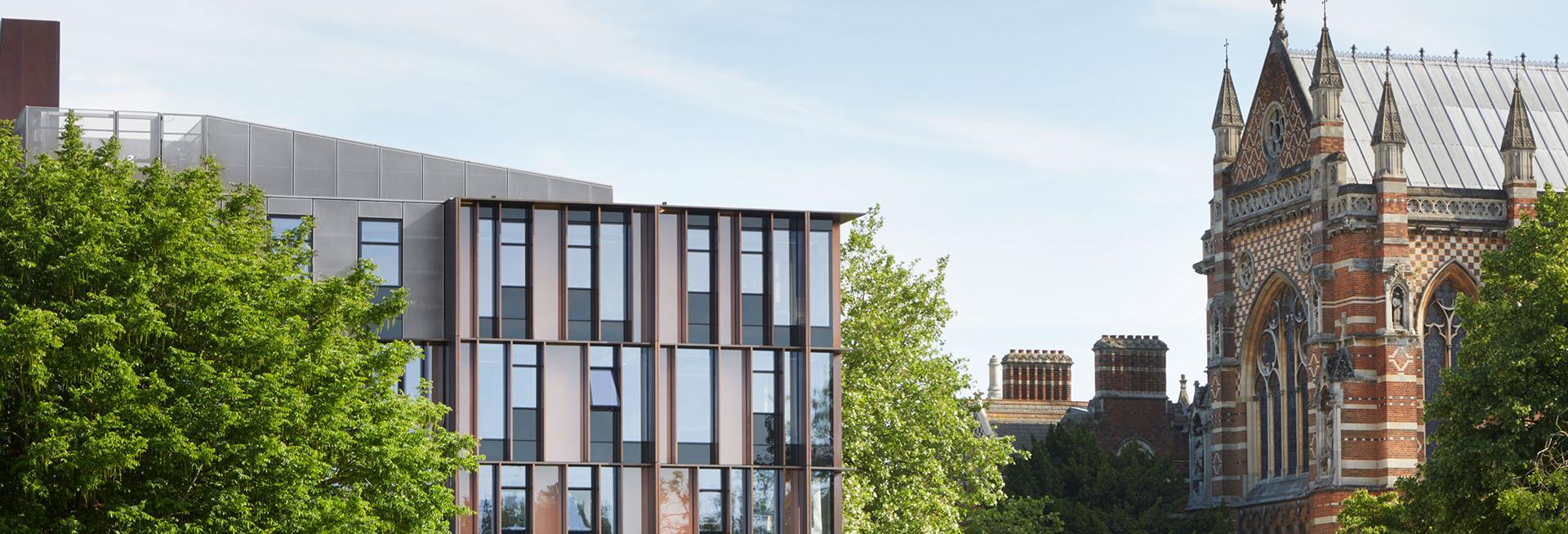The internal physics selection process for the current round of this fellowship is now closed
Summary
Next Internal departmental EOI deadline: ~ August 2026
Next University submission deadline (IRAMS): ~October 2026
Fellowship start date: From ~May 2027)
- Two-year fellowship supporting the use of AI/ML techniques to transform research in the natural, mathematical, and engineering sciences.
- Covers salary (Grade 7), research and travel expenses, computing equipment, and visa/NHS surcharge.
- Fellows receive structured AI/ML training, mentoring, and professional software engineering support.
- Does not fund core AI research in computer science, statistics, or pure mathematics.
- All queries should be directed to: fellowships@physics.ox.ac.uk
More details are available on the Oxford Schmidt AI in Science website.
Overview
The Eric and Wendy Schmidt AI in Science Postdoctoral Fellowship, a programme of Schmidt Futures, enables researchers in STEM to apply Artificial Intelligence (AI) and Machine Learning (ML) techniques in innovative ways. The scheme supports research that integrates AI/ML with internationally leading science, with a goal of achieving step-changes in understanding or application.
Oxford Physics runs an internal selection process because there is a cap on how many applications the department may support for the university selection process. Selected candidates will receive guidance from the Research Facilitation team and be supported in preparing a strong interdisciplinary application.
Eligibility
Applicants must:
- Hold, or be close to completing, a PhD/DPhil in a STEM discipline (mathematical, physical, or life sciences).
- Be proposing research that applies AI/ML techniques to enhance or accelerate progress in a STEM field. Core AI research is not supported.
- Demonstrate general understanding of how AI/ML could be used in their proposed research area, including potential ethical implications.
- Secure support from a faculty member in Oxford Physics who will act as their host academic.
- Ideally identify an AI/ML mentor at Oxford with appropriate methodological expertise (optional at EOI stage but required later).
Typical timeline
- 1 August – IRAMS applications open
- 12 August – Internal Oxford Physics EOI deadline:
Submit your EOI to fellowships@physics.ox.ac.uk, including:- CV (max 3 pages including publications; Arial 11pt, 2cm margins; note any career breaks/part-time working)
- 1-page research proposal (emphasising how AI/ML will transform your STEM research)
- 400-word training plan describing the AI/ML skills you need to acquire and how these will support your work
- Cc your host academic (aka sponsor) in Oxford Physics
- Identify your proposed Sub-department
- Astrophysics;
- Atmospheric, Oceanic and Planetary Physics;
- Atomic and Laser Physics;
- Condensed Matter Physics;
- Particle Physics; or
- Theoretical Physics
- Optional: Identify your AI/ML mentor (optional at EOI stage, but required at the full application stage)
- 1 September – Outcome of internal selection announced
- 17 October – Full application submission via IRAMS
- December – Shortlisted applicants interviewed (dates TBC)
Additional information
Host academic / Sponsor
All applicants must be supported by an academic in Oxford Physics who will act as their sponsor for the duration of the fellowship. This person must agree to host the research within their group and should be contacted well in advance of the internal deadline.
AI/ML mentor
Applicants are encouraged to identify an Oxford-based AI/ML mentor with appropriate subject-matter expertise. Mentors will be asked to provide a short statement of support at the full application stage, but are not mandatory at the EOI stage.
Mentors are not expected to provide training but should advise on project design and training needs, meet with the fellow approximately monthly and support the fellow’s development in applying AI techniques
Programme structure and training
The Fellowship is integrated within Oxford’s Mathematical, Physical and Life Sciences Division (MPLS), with participation from all science departments, including Physics. Fellows will:
- Be embedded in host research groups within MPLS departments
- Receive individualised AI/ML training via graduate courses and one-to-one tuition
- Undertake structured training on the ethical and social implications of AI use
- Work closely with professional Research Software Engineers (RSEs) who provide support and training on:
- Software development best practices
- HPC/cloud computing
- Reproducible research workflows
Fellows are also connected to the international Schmidt Sciences network and expected to attend funded cohort events alongside peers and global leaders in AI and STEM.
Assessment criteria
Oxford Physics and university panels will assess applications based on:
- Fit to call –the underpinning applied science must be internationally leading, with the application of AI/ML techniques appropriate and likely to lead to a step-change in the application domain.
- AI/ML understanding – Clear grasp of how AI will be used and its potential benefits
- Training plan – Evidence of how the fellow will benefit from AI training and apply it effectively
- Applicant quality – Research track record appropriate to career stage
- Cohort fit – Willingness and ability to contribute to, and benefit from, the interdisciplinary cohort
Proposals will be assessed by a multidisciplinary panel — you should assume reviewers may not have expertise in your specific scientific domain or AI methods. Write clearly and accessibly.
Equality, diversity and inclusion
Oxford Physics supports flexible working and career breaks and recognises that a range of personal circumstances may influence career progression. We welcome applications from those with non-linear career paths or those returning to research following a break (e.g. due to illness, caring responsibilities, parental leave, or work outside academia). Applicants are encouraged to highlight any relevant circumstances in their EOI or to discuss them confidentially with the Research Facilitation team at fellowships@physics.ox.ac.uk.
We particularly encourage EOIs from individuals from underrepresented groups in Physics. Should any candidate have difficulty in securing a host academic within the department or need further guidance on this, please contact the facilitation team and we will endeavour to support you. If you require specific support or accommodations during the application process, please let us know.
For further information on our approach to EDI, visit our ED&I webpage.

